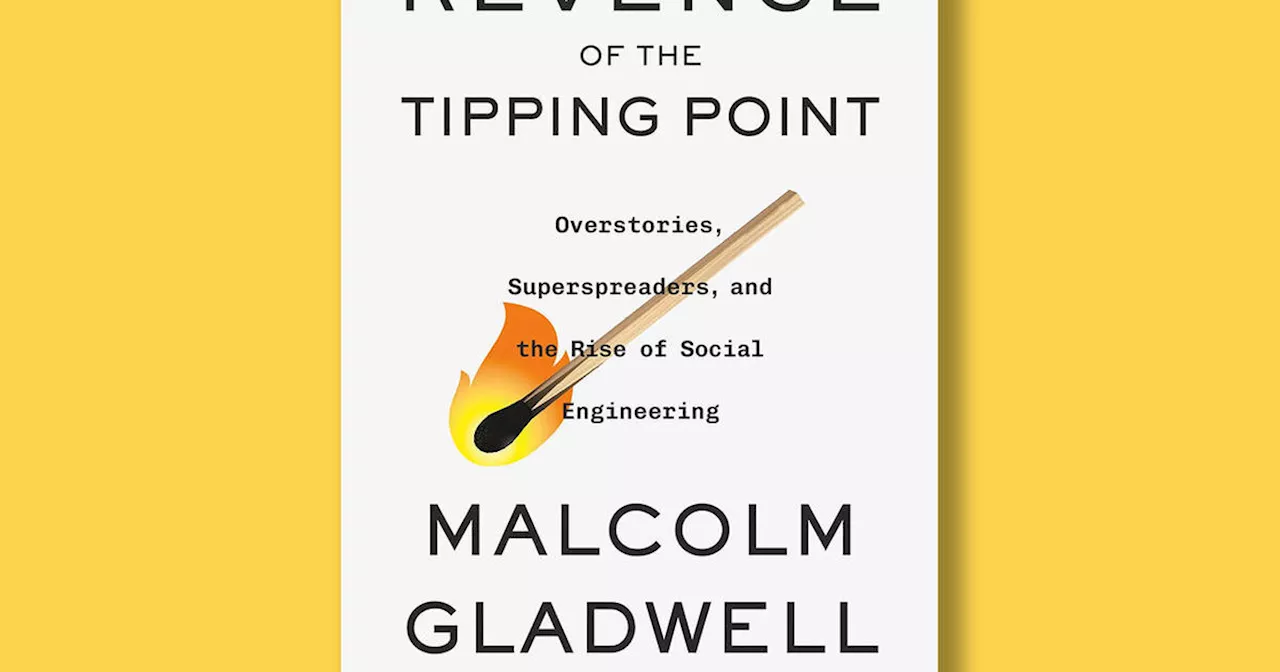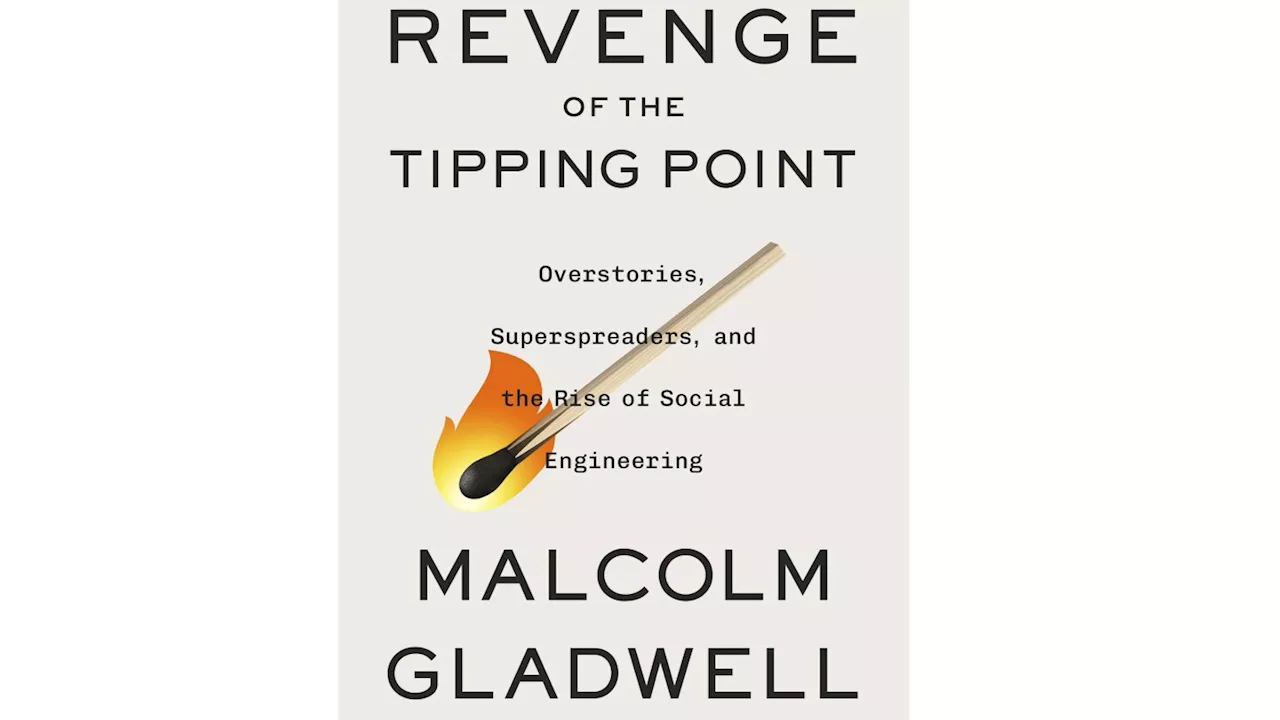HBR editor in chief Adi Ignatius speaks with Malcolm Gladwell about his new book, 'Revenge of the Tipping Point,' which examines how tipping points can be used for harmful purposes. Gladwell revisits his groundbreaking work on tipping points, considering their impact on social engineering and the spread of negative behaviors.
There was a time when business leaders and managers didn’t worry so much about psychology or other social science research.writing played a big role in changing that. His popular exploration of tipping points — the phenomenon where small, incremental actions can suddenly fuse into a full-blown social behavior — brought research insights to life and made them mainstream. Now he’s revisiting tipping points , this time looking at how they can be used for damaging results.
MALCOLM GLADWELL: Well, I think what happened in the ’90s was that the kinds of people who went into business were much better educated, much more intellectually curious, and more than that had become convinced that one of the keys to being successful in business was to be engaged in the world outside of business.
ADI IGNATIUS: The whole phenomenon of a Tipping Point, of ideas, of behavioral patterns going viral has probably changed a lot since the book came out. It was published before the spread of smartphones, before social media, before TikTok, before the dawn of algorithms that know us better than we know ourselves. This book doesn’t deal a lot with the new technology, but-ADI IGNATIUS: Okay. Well, but still, you’re living in this world and thinking about this world.
ADI IGNATIUS: There’s a really interesting analysis that starts with looking at why some states in the U.S. suffered far more than others in the opioid epidemic, and I won’t give it away, but it’s not about education or economic opportunity that you might think. So that’s the first part of what’s going on.
ADI IGNATIUS: The first Tipping Point book, my memory of it is that your argument was these ideas that they built solely over time, and then there is this Tipping Point and suddenly boom, it’s out there. The second book seems to be a little bit more about how people understand that phenomenon and try to take advantage of it for better or worse.
The reason that’s important for epidemics is that one of the principles we know about epidemics is that they thrive in monocultures. When there is very little diversity in a group, an infectious contagious agent can race through the entire group without encountering any kind of barriers.
MALCOLM GLADWELL: I’m in the position of the journalist, not the researcher. The journalist is someone who stands between the academic or the original source and the public. And our job is quite different from that of the academic because our job is to translate for a wider audience, and we are a necessary part of the kind of intellectual ecosystem.
MALCOLM GLADWELL: Absolutely. The crime chapter. So the centerpiece of the first book was a chapter on why did crime fall in New York City? And the general observation of that chapter that violent crime has epidemic properties, it’s a contagious behavior, is something that is now accepted and taken for granted among social scientists.
That was an idea which I believed, other people believed at the time, and which we subsequently realized is 100% wrong because New York City stopped Stop and Frisk in 2012, and then the crime rate, not just continued to fell, but fell another 50%. So clearly whatever was being done by the police in those early years was not what was driving down the crime rate.
MALCOLM GLADWELL: I think it should be fine. I think when you talk about how you think there’s a crisis in social science, I think the crisis is in part caused by that very thing. It should be fine to raise your hand and say, “We thought this for years and years and years, and now we’ve learned something new. And the reason we’ve changed our mind is that the nature of what we do is conditional.
And the women weren’t doing well, and they wanted to know why. And so they bring in Rosabeth to do an analysis. Her first thing is she says, “The women are talented. You didn’t hire people who aren’t good.” Her second observation is, “There’s nothing wrong with your company culture. This isn’t a hostile workplace, it’s not a dysfunctional organization.”
I find that really, really interesting. And what they’re describing, of course, is an epidemic process. What they’re saying is that group identity tips at a certain point, and the newcomers go from being isolated tokens to being real participants, and they change the character of the group they’ve joined when they’re at critical mass.
If you want to have four different kinds of voices, then you have to make sure that these divergent groups are each represented in sufficient numbers, that they can be themselves, they can have a real impact on the group. I was rereading the historical accounts of the great foreign policy fiasco of the Kennedy administration, the Bay of Pigs Invasion, which is where the famous Urban Janis book Groupthink, is written about The Bay of Pigs.
MALCOLM GLADWELL: So overstories is this idea that I was trying to make sense of what is known in the healthcare world as small area of variation, this kind of very robust observation, that there are dramatic differences in the way that doctors practice from one community to the next. An observation that was first made over 50 years ago and has since been shown to be true on numerous occasions, and it’s something of a mystery as to why this would be the case.
ADI IGNATIUS: You know, what would you want leaders, let’s say, of people, of institutions to take away about the phenomenon, the Tipping Point phenomenon, everything you’ve studied that will make them better at their jobs, help them build better organizations, have better ideas?
Tipping Points Social Engineering Malcolm Gladwell Virality Human Behavior
United States Latest News, United States Headlines
Similar News:You can also read news stories similar to this one that we have collected from other news sources.
 Malcolm Gladwell revisits 'The Tipping Point' that sent him to literary stardom'Revenge of the Tipping Point' updates the original with more theories, stories and arguments about how phenomena become epidemics.
Malcolm Gladwell revisits 'The Tipping Point' that sent him to literary stardom'Revenge of the Tipping Point' updates the original with more theories, stories and arguments about how phenomena become epidemics.
Read more »
 Book excerpt: 'Revenge of the Tipping Point' by Malcolm GladwellThe author revisits his 2000 bestseller 'The Tipping Point,' to examine the flip side of that earlier book's lessons about studying social change. Among the topics he covers: Cheetah reproduction.
Book excerpt: 'Revenge of the Tipping Point' by Malcolm GladwellThe author revisits his 2000 bestseller 'The Tipping Point,' to examine the flip side of that earlier book's lessons about studying social change. Among the topics he covers: Cheetah reproduction.
Read more »
 Malcolm Gladwell revisits his landmark work with 'Revenge of the Tipping Point'Malcolm Gladwell revisits the concept of social epidemics in his latest book “Revenge of the Tipping Point: Overstories, Superspreaders, and the rise of Social Engineering.” The Associated Press' Andrew DeMillo writes that the book is essentially fan service for readers who enjoyed Gladwell's 2000 book, “The Tipping Point.
Malcolm Gladwell revisits his landmark work with 'Revenge of the Tipping Point'Malcolm Gladwell revisits the concept of social epidemics in his latest book “Revenge of the Tipping Point: Overstories, Superspreaders, and the rise of Social Engineering.” The Associated Press' Andrew DeMillo writes that the book is essentially fan service for readers who enjoyed Gladwell's 2000 book, “The Tipping Point.
Read more »
 Malcolm Gladwell’s New Take on Tipping PointsA conversation with author Malcolm Gladwell updating popular ideas about virality and human behavior.
Malcolm Gladwell’s New Take on Tipping PointsA conversation with author Malcolm Gladwell updating popular ideas about virality and human behavior.
Read more »
 Malcolm Gladwell's new vision of the world ahead of us: Our lives 'can be tipped'Holocaust (1978) Trailer | NBC
Malcolm Gladwell's new vision of the world ahead of us: Our lives 'can be tipped'Holocaust (1978) Trailer | NBC
Read more »
 Author Malcolm Gladwell to discuss new book at North Texas churchBestselling author Malcolm Gladwell will discuss his new book, 'Revenge of the Tipping Point,' in a conversation with KERA-FM host and managing editor Krys...
Author Malcolm Gladwell to discuss new book at North Texas churchBestselling author Malcolm Gladwell will discuss his new book, 'Revenge of the Tipping Point,' in a conversation with KERA-FM host and managing editor Krys...
Read more »
